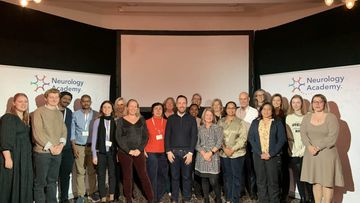Workstream E: Wellness and lifestyle – Get involved
Dr Agne Straukiene, consultant neurologist at Torbay and South Devon NHS Foundation Trust, is a representative on the national ‘Raising the bar’ steering group and the lead for this workstream.
Objectives:
- To review the evidence that wellness and lifestyle interventions improve MS outcomes
- To define measurable outcomes in this area.
- To set achievable goals for the year ahead to increase awareness of and focus on health and wellness in MS patients
Overview of the workstream
The workstream examined some of the evidence available in support of health and wellness measures as a means to support people with MS, improve their quality of life, their experience of their condition, and the way their condition progresses.
Some of the key information shared included:
- What do we mean by health and wellbeing? A clear review, from the history, where Greek practitioners considered health across both medical intervention, and ‘hygiene’ or wellness, to the ‘pillars of healthy living’ (fig 1).

- Data in support of a range of elements across health and wellbeing, from diet and nutrition to mindfulness (fig.2)

- Messaging is very important and this can be a very sensitive area of discussion. Tailoring information shared, wording used and style on information sharing based on feedback from your patients is essential.
- Engaging with expert patients in your area who can run a healthy living clinic alongside you, or can set up something similar with support from the healthcare team, to promote healthy living patient to patient, is very positive.
- Learning from AltogetherBetter may be applicable here, and embracing patients as partners.
- Ultimately, a person will only act on improving their health and wellness if they enjoy it. Making lasting change with impacts on overall wellness comes from a place of joy and it is that which will engage people (fig 3).

Our goals for the year ahead
Scoping exercise:
Map out what is available in your area in terms of healthy living. For example:
- The HOPE programme (life coach programme),
- FACETs (for fatigue),
- Healthy lifestyle teams,
- Social prescribing
- Voluntary organisation-run courses or classes
- Clinician-run exercise classes, etc
- Smoking cessation, walking groups
- Community-established initiatives e.g. park runs
Access to healthy lifestyle clinics
Consider swapping one regular neurologist-run clinic per month for a healthy lifestyle clinic.
- This is not an additional service but a swap, it should not incur a cost
- Trial this for 6-12 months and monitor impact
- Choose a patient group to target - consider using PAMs and a behavioural change cycle to assess the most receptive patients to get in touch with.
- Torbay can share their slides and their set up for replication and adaptation as needed.
- Engage expert patients who can help to run clinics, groups or other forms of encouraging healthy lifestyles so that messages are passed from patient to patient rather than physician to patient
- Think about including work support and addressing fatigue in healthy lifestyle clinics as work concerns ands associated fatigue can have a huge impact on stress, and hope or certainty in a future.
- Find out if you have block contract – there is more freedom to trial new ways of working within existing clinics to achieve better outcomes for patients
Get to know the needs and motivations of your patients
- Exploring what your patient’s background was before they developed MS so you understand their motivators, lifestyle choices, and can better suggest lifestyle changes that they will want to embrace and will best serve them.
- Understand what makes each individual happy to suggest the areas of healthy living and wellness that will be effortless for them, to make it sustainable.
- Support patients in small, incremental changes so that they can see the impact on their lives - starting with one or two elements in one or two pillars (fig 1).
More information:
- Read the background to this workstream
- View the timeline for how this fits into the bigger picture this year
- Read an interview with Agne as she sets out her vision for this workstream in more detail, outlines her motivations and shares the evidence behind them. Feel her tangible enthusiasm for this work and get involved!
- Find out about the other workstream’s goals
- Read more: Health and wellness could revolutionise management of long term neurological conditions
- Listen to this presentation:
[gallery size="large" ids="5231,5234,5243,5232,5247,5233,5245,5237,5238"]
Related articles
Encouraging excellence, developing leaders, inspiring change
MS Academy was established five years ago and in that time has accomplished a huge amount. The six different levels of specialist MS training are dedicated to case-based learning and practical application of cutting edge research. Home to national programme Raising the Bar and the fantastic workstream content it is producing, this is an exciting Academy to belong to.


